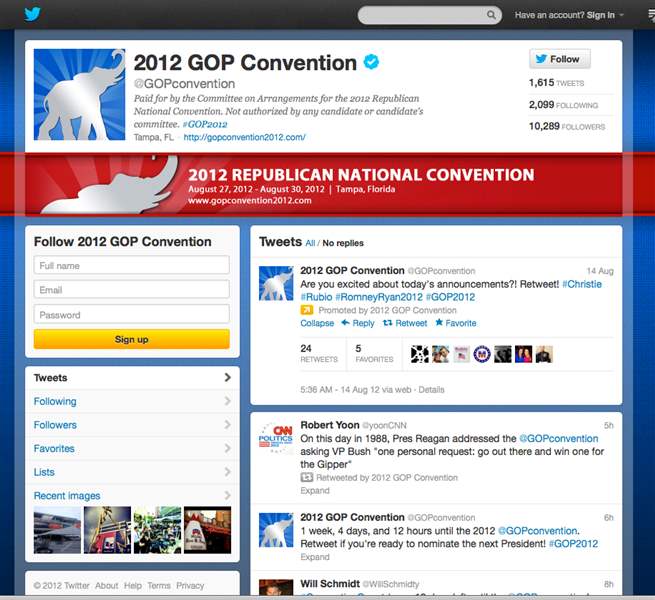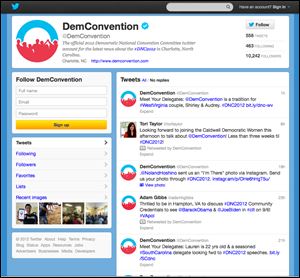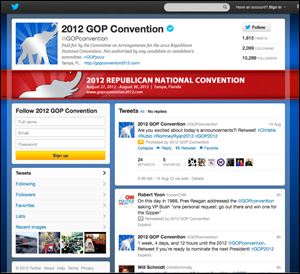
Goodbye smoke-filled rooms: Republican, Democratic conventions embrace social media openness
8/17/2012
The Republican National Convention committee's Twitter feed is at twitter.com/GOPconvention.

The Democratic National Convention Committee's Twitter feed is at twitter.com/DemConvention.
CHARLOTTE, N.C. — Democrats and Republicans are using social media to turn their national conventions away from the smoke-filled rooms of yore and into meetings where anyone who wants to get involved is just a click away, no matter where they are.
Both parties' ambitious plans reflect the maturation of social media sites that played a much smaller role in the conventions four years ago. The Republicans call theirs a "convention without walls," while the Democrats say their gathering will be "the most open and accessible in history."
Democrats will not just show prime-time speeches live on the Internet, but will also stream caucus meetings and the council discussions of the party's platform and ideals over the Web. Republicans have hired a full-time blogger and a full-time digital communications manager to do nothing but engage people online.
The conventions' Facebook and Twitter sites are already stoking interest in the events, with photos of the Republican stage under construction in Tampa or profiles of Democratic volunteers and delegates. Users can interact with a mouse click, such as one who urged friends to help the GOP convention Twitter feed muster more followers than its counterpart. Both had more than 10,000 followers Friday.
Social media was still in its infancy four years ago. The number of items posted on Twitter on Election Day 2008 is equal to about six minutes worth of tweets today, the social media company recently wrote on its blog.
The dramatic changes in social media have required both parties to almost start from scratch in developing strategies for incorporating Facebook, Twitter, YouTube, Instagram and Flickr into their conventions.
In 2008, Republicans hired a web vendor to handle all things Internet for their convention. Now, there's a dedicated social media team with its own "Social Media War Room" in the Tampa Convention Center. The party's biggest push through the Internet will come through videos on YouTube, Republican National Convention spokesman James Davis said.

The Republican National Convention committee's Twitter feed is at twitter.com/GOPconvention.
"Our goal is to leverage these technologies, to reach every American, whether they are in Toledo, Ohio, the convention floor in Tampa or a forward operating base in Afghanistan," he said.
Democrats will have a similar setup at their convention Sept. 4-6 in Charlotte. (Republicans meet a week earlier in Tampa.)
"We're able to expand it even further and invite the whole country to participate in a more interactive way then you might traditionally experience by tuning into a television," said Nikki Sutton, director of digital media for the 2012 Democratic Convention.
And those planning protests are using the Internet to get organized, too. The March on Wall Street South, which plans to bring thousands to Charlotte to rally against big business and economic inequality, has a website, Facebook page and Twitter account.
Organizers hope to use the Web to direct people to sites in more than a dozen states where they can take buses to Charlotte to join in the various protests during the week.
Social media is allowing modern-day campaigns and political parties to get their messages out unfiltered. That's especially useful as broadcasters and newspapers have drastically reduced the amount of air time and space they devote to conventions.
Convention organizers will use social media to emphasize themes that might get lost in the traditional media's limited coverage, said David Kreiss, an assistant professor at the University of North Carolina at Chapel Hill journalism school who authored a book about the use of new media from former presidential candidate Howard Dean to President Barack Obama.
"There's just not a lot of convention coverage that is going to be offered by the major networks, and this becomes a way that individual figures' speeches get publicity," Kreiss said.
Social media is increasingly allowing parties to control their message — and spreading those key messages through an online network of "friends" may allow them to create a sense of credibility, Kreiss said. It will be "viewed as more credible and more authentic" than less-personal media coverage.
The candidates' overall campaigns are also ratcheting up efforts to reach voters online. A report released Wednesday by the Pew Research Center found that President Barack Obama's campaign was more active than Republican Mitt Romney's on the digital front.
The group's Project for Excellent in Journalism analyzed both campaigns' efforts between June 4-17 and found Obama's team posted almost four times as much content during the period and maintained an active presence on almost twice as many platforms. But Romney's campaign said his Facebook page has more people who share or comment on his posts.
Of course, the only metric that matters will be votes in November, and both campaigns and their parties think social media will be critical to get their voters excited enough to go to the polls.
Democrats have already released a smartphone app that provides one place for videos, blog posts and photos. The app also includes an interactive map to help visitors to Charlotte find convention locations or restaurants.
Their convention Facebook site has been running posts spotlighting different delegates and volunteers from across the country for months. Its Flickr page included more than 150 photos from people who printed out a special "I'm There" logo and had their pictures made with it, promising to either be in Charlotte or to follow the convention online. One person holding up his sign on the site is Vice President Joe Biden.
On the GOP convention's Facebook page, a posting showed a picture of lighting rigs inside the Tampa Bay Times Forum and said: "The lights are on and we only have 17 more days to go! Are you ready to nominate the next President of the United States?? The entry had more than 360 "likes" and 400 comments on Wednesday afternoon.
The Democrats used Twitter to invite more than a dozen followers on a tour in July. They got to see Time-Warner Arena, where most of the convention is taking place the first week in September, and the city's football stadium, where Obama will give his acceptance speech.
For Rashon Carraway, the tour was a dream come true. He sells men's clothes online, but the political science major in college hasn't forgotten his first love.
"This was a great opportunity for me to get an up close and personal look at something I am passionate about, and I have always wanted to do," said Carraway.
He plans to attend as many convention events as he can — using his cellphone to make online posts.
And it's just not the parties and protesters who have an interactive strategy.
Donna Chen, the director of marketing and communications for the Tampa Downtown Partnership said more than 15 tourism and convention groups are setting up their own "Social Media Command Center" for the convention.
Tampa Bay and Co., the area's tourism and marketing agency, is coordinating the effort. They'll use the hashtag "TampaBay" to curate the posts.
Chen said about 50 local experts will monitor and interact with people online. They will staff the center and answer questions about the area from people in town for the convention — for instance, "where's a good Italian restaurant?" or "What's the closest beach to downtown Tampa?"